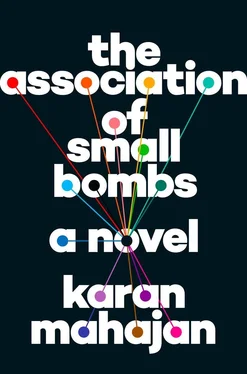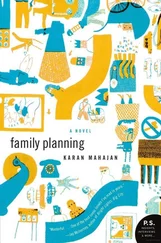“Yes, Mama,” Mansoor said. “As long as I take breaks.”
“We should get permission from the doctor first.”
________
So Mansoor went over with the driver to the clinic in Safdarjung.
He had been avoiding this the past few months. The nerve conduction test was the only objective measure of how you were doing and healing; by hooking you up to sensors and sending currents through your nerves, the doctors could determine how badly damaged they were. Mansoor had had such a test before in the U.S. He’d been frightened by the name, by its electric inelegance, but was relieved by how minor the shocks were, the way they felt like subcutaneous pinches.
The doctor wasn’t the stately sardar he usually dealt with but rather a lumpy Bengali man with gapped teeth and large moles under his eyes, wearing a lab coat, with a fixed smile.
“Hello, hello,” he said when Mansoor entered the small consultation chamber with its laminated surfaces and shelves piled with prizes from medical associations.
When Mansoor told him why he was there, he got up from his seat and removed a device from behind a glass case that looked like an old typewriter, complete with the gray fuzzy plastic shell.
Mansoor, sitting on a steel stool, tensed up. What if this Soviet-looking device was defective and hurt his nerves? What if the electricity went in the middle of the test?
“Put your wrists forward,” the doctor said and then tied the wires around his wrists like rakhis. Before Mansoor could speak, the current, warm and beery, started. He relaxed. It wasn’t as bad as he’d thought. His system wouldn’t be permanently rewired.
“What do you do?” the doctor asked after a while.
“I’m a student.” It was odd for Mansoor to be talking to this man without his mother’s mediation. “BTech,” he continued. “I’m studying computers.”
“Well, Mansoor-ji, you better find another profession.”
Mansoor looked at him with the calm that comes to people when they receive the news they have been dreading — the calm of disbelief; also perverse, awful relief.
“Your nerves are badly damaged,” the doctor continued. “You’ll never be able to type. You should find a profession that doesn’t require typing. Luckily, for your generation, there are many options. You could become a teacher or a professor.”
Somehow Mansoor endured this lecture. Do something else? But there was nothing else for people of his generation to do! They were hooked to machines. Everywhere one turned one encountered screens, keyboards, wires. And once again Mansoor experienced the bitterness he’d felt when the physiotherapist in the U.S. had told him he was suffering the consequences not just of the bomb but of years of mishandling his computer — why hadn’t anyone told him? Why was he allowed to throw his injured body at these boxes of signals? Even in the U.S., on his pristine Californian campus, there had been no instructions about how to protect his wrists from repetitive stress injuries — the keyboards in the computer cluster were far from ergonomic — and in any case most people had laptops and spent their days and nights hunched over them, writing papers, playing movies, sending e-mails, and downloading porn on the high-speed networks. And now, after I’ve destroyed everything, they tell me? That’s the meaning of having survived the bomb. I didn’t survive at all. I just spent longer dying, rendered crippled and obsolete like that old 486 on which I acquired my first repetitive injuries.
He walked out of the office with his hands in his pockets and the world wild and broken around him — dust in the air; haze against the eye; telephone and electric wires stretching around the colony like a noose; the rust visible on the chain-link fence of Deer Park, across the street; the rank odor of the gutter in his nose; the freshly tarred road like a living, breathing thing, a rising piece of bread, rolled flat by the cars’ tires.
When he told his mother the news, she grimaced at first in a show of strength, and then burst into tears. “Why is this happening to us?” she said. “Two thousand three. It’s a terrible year. We must get a second opinion.”
“No,” he said. He was done with doctors.
At home, Mansoor found himself in the grip of a profound anger. He kept looking back at the day of the bombing and seeing Mr. and Mrs. Khurana skulking about and talking in their bright house, tall human adults in their forties, Mr. Khurana in a white shirt and khaki pants, Deepa Auntie in a red kameez dyed with purple mangoes running down the front in parallel rows (how vividly he remembered the details of that day, as if it had been stained by the wine of memory), full of domestic swagger and confidence, lost in their adult world, discussing bills and the latest gossip about a relative who had left her husband, the kids playing around and under them, kids they were eager to shoo out. Why had they been so irresponsible — with him in particular? But Indians were like that, happy to be puppets of fate. “Chalta hai.” “It’s in God’s hands.” “Everything goes.”
When Mansoor had told Vikas Uncle he’d call his mother so she could pick him up, Vikas Uncle had perversely cajoled him into going with Tushar and Nakul to the market. “Don’t worry, yaar,” he’d said, sitting back lazily in the sofa chair, his arms forming a relaxed hammock behind his head. Mansoor hated him.
The Khuranas had never apologized to him.
Mansoor’s thoughts flew in a circle of rage. His wrists hurt, his back throbbed, he sweated, his sciatica sparked. In his room, he turned the pages of ten odd books strewn on his bed — the Chomskys, Roys, Dalrymples. He wasn’t reading them, but testing his pain; even turning a page hurt. He was a highly defective machine, sensitive to everything.
When he sat on the sofa in the drawing room, the same old drawing room with its chests from Korea and Indonesia, its frantic unreconstructed Orientalism, the Orientalism only allowed to people in the Orient, a sickly current, like that of a tube light about to die, vomiting the last of its milky light, filled the columns of his arms.
Surrounded by unfeeling objects, his parents off to the lawyers to discuss the case and to figure out how to keep the business running (Sharif ran a plastics consulting and supply company), he began to whimper. Nothing had changed for him since the day after the bomb, when he had come back home to this very pain.
During a moment of insanity, he imagined doing something different — becoming a full-time activist and teacher with the group, traveling around the country and educating people about communal violence and… carpal tunnel. What if he became a doctor or physiotherapist like that South Indian bore Jaya? Well, that would be amusing!
Eventually, out of loneliness and rage, Mansoor returned to volunteering for Peace For All.
The group meetings were the same — the discussions about the 1996 inmates had been put on hold to develop strategies to protest Modi when he arrived in Delhi a few weeks from now — but Mansoor, sitting on the floor, a mute spectator to the verbal drama, haggard and uneasy, avoiding Ayub, began to notice something strange: his pain had become much worse after the nerve conduction test. Whereas before he’d experienced a snipping tension and tiredness and a subcutaneous wetness, now an elastic, electric current spread through his limbs, dizzying him with its dull throb, making him feel like an overly tightened string instrument.
He began to wonder if there was something to Ayub’s notion that the pain was partly mental, seeing how it had jumped after the diagnosis from the doctor. At home, on his bed, enclosed by a life-size poster of Tendulkar on one side and of Michael Jackson on the other — old posters from the age of fourteen he had never taken down or replaced — he began to read the book Ayub had given him, The Religion of Pain .
Читать дальше












